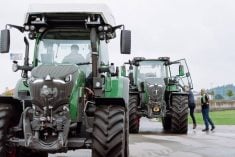VICTORIA – British Columbia’s new agriculture minister brings farm and financial backgrounds to his fourth portfolio since being elected in May 2009.
Ben Stewart grew up on the family fruit farm near Kelowna, B.C., but went to work in the banking industry immediately following high school.
He had previously been responsible for community and rural development, citizens’ services, multiculturalism and the public affairs bureau.
He replaces Steve Thomson, who became minister of natural resources operations.
“Agriculture has gone through a period where we’ve been somewhat ignored,” Stewart said.
Read Also

Canadian Food Inspection Agency slammed for handling of bovine tuberculosis case
The federal government leans heavily on producers to “take one for the team” and risk their livelihoods without any reassurance of support.
“Minister Thomson worked hard to reinvigorate the process. I want to ensure it has as much support in terms of the economy, but it will really only grow if it produces sustainable results.”
Stewart said B.C.’s agricultural products must be promoted and sold to the maximum level within the province.
He said trade barriers continue to stifle the sale of B.C. agricultural products outside of domestic borders.
However, he also said that a recent trade trip that Thomson made to Asia resulted in China expressing more interest in Canadian beef imports.
Stewart is well acquainted with B.C.’s apple industry and said the province is a leader in research and storage technology. He also said B.C. apples taste better than those grown in Washington state.
As B.C. orchardists face falling prices and competition from U.S. apples, Stewart said they must promote their products to assure consumers that their apples are safe, have good value and are more flavourful than imports.
Stewart traces his agricultural lineage to Ireland, where his grandfather, Richard Stewart, worked in Lord Guinness’s greenhouses.
He arrived in the Okanagan Valley in 1908, when Kelowna had 500 residents, and started Stewart Brothers’ Nurseries in 1911, which became a major fruit tree supplier in the Okanagan Valley and sold apple trees to Washington state.
Stewart’s father, Dick, bought land on the slopes of Mount Boucherie in 1956, where he planted wine and table grapes, cherries, peaches, apples and pears. At one point, the farm produced 25 percent of B.C.’s table grapes.
By 1971, Dick was experimenting with new grape varieties as he worked to build a quality, made-in-B.C. wine business. Ben Stewart returned from his banking career to work on the farm and learn about wine-making.
Stewart visited France, Germany, California, Oregon and Washington, where he learned what makes a great wine. One of his goals is to bring a university-level course in wine-making to the University of British Columbia’s Okanagan campus.
Stewart’s son studied wine production in New Zealand because no such university-level course was offered in Canada.
In 1980, Stewart was elected to B.C.’s Grape Marketing Board and became chair in 1985.
They were tumultuous years, culminating in 1987 when the wine industry chose not to contract grapes from B.C. producers. Dozens of producers, accustomed to commodity-type purchasing, pulled out their vines and replanted fruit trees.
There were 940 acres in grape production by the late 1980s and eight licensed wine producers, he said.
Today, wine grapes are grown on 10,000 acres in B.C. and there are 180 licensed wineries.
Stewart attributed the success to the elimination of the supply-managed boards.
One thriving B.C. winery is Quails’ Gate, which Stewart launched in 1989 with his brother Tony.
Quails’ Gate had one employee when it opened as a farmgate business. The estate winery now employs 180 people.
Stewart has also been past-chair of Vintners Quality Alliance Canada, where during his time he dealt with trademark protection and international mutual recognition agreements respecting national wine and health standards.
———
These two really know farming. But only one of them works at the bank.
TD Canada Trust Agriculture Specialists understand farming. In fact, we have years of experience in agriculture and understand the factors that affect the industry in Canada. So whether you’re looking to expand your operation, finance equipment, quota, or livestock, or improve your cash flow, we’re always ready to provide insightful, one-on-one advice and innovative financial solutions tailored to your specific needs. Our specialists work to build a long-term relationship with you, your business, and the next generation of proud Canadian farmers. Because we know you have goals for your farm, and we want to help you achieve them. Contact one of our Agriculture Specialists today.
Visit a branch or
www.tdcanadatrust.com/agriculture to contact one of our Agriculture Specialists.














